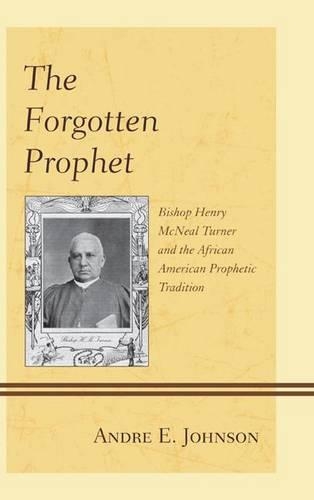
The Forgotten Prophet: Bishop Henry McNeal Turner and the African American Prophetic Tradition
(Paperback)
Publishing Details
The Forgotten Prophet: Bishop Henry McNeal Turner and the African American Prophetic Tradition
By (Author) Andre E. Johnson
Bloomsbury Publishing PLC
Lexington Books
3rd June 2014
United States
Classifications
Professional and Scholarly
Non Fiction
Christianity
Religious ministry and clergy
Sermons
Ethnic studies / Ethnicity
287.8092
Winner of 2013 NCA Outstanding Book Award for the African American Communication and Culture Division.
Physical Properties
Paperback
136
Width 155mm, Height 230mm, Spine 11mm
213g
Description
The Forgotten Prophet: Bishop Henry McNeal Turner and the African American Prophetic Tradition, by Andre E. Johnson, is a study of the prophetic rhetoric of nineteenth century African Methodist Episcopal Church bishop Henry McNeal Turner. By locating Turner within the African American prophetic tradition, Johnson examines how Bishop Turner adopted a prophetic persona. As one of Americas earliest black activists and social reformers, Bishop Turner made an indelible mark in American history and left behind an enduring social influence through his speeches, writings, and prophetic addresses. This text offers a definition of prophetic rhetoric and examines the existing genres of prophetic discourse, suggesting that there are other types of prophetic rhetorics, especially within the African American prophetic tradition. In examining these modes of discourses from 1866-1895, this study further examines how Turners rhetoric shifted over time. It examines how Turner found a voice to article not only his views and positions, but also in the prophetic tradition, the views of people he claimed to represent. The Forgotten Prophet is a significant contribution to the study of Bishop Turner and the African American prophetic tradition.
Reviews
Andre Johnsons study of the speeches of Henry McNeal Turner, from his optimistic Emancipation Day Address in 1866, to sober reflections on the fiftieth anniversary of the proclamation in 1913, is an important step in recovering the story of African-Americans in the South during Reconstruction. Framing Turners powerful words as examples of prophetic rhetoric, Johnson shows how even Turners most pessimistic comments spoke to a wide audience eager for freedom yet demoralized by prejudice, discrimination, and violence. Although Turners answer to the nations racismemigrationdid not become a major movement in his lifetime, Johnsons study of Turners prophetic voice enlarges our understanding of this neglected, but important figure in American history. -- Sandra J. Sarkela, The University of Memphis
Author Bio
Andre E. Johnson is the Dr. James L. Netters professor of Rhetoric & Religion and African American Studies at Memphis Theological Seminary.
